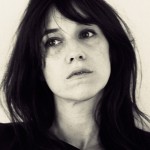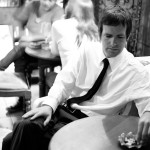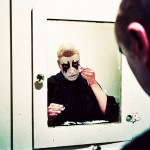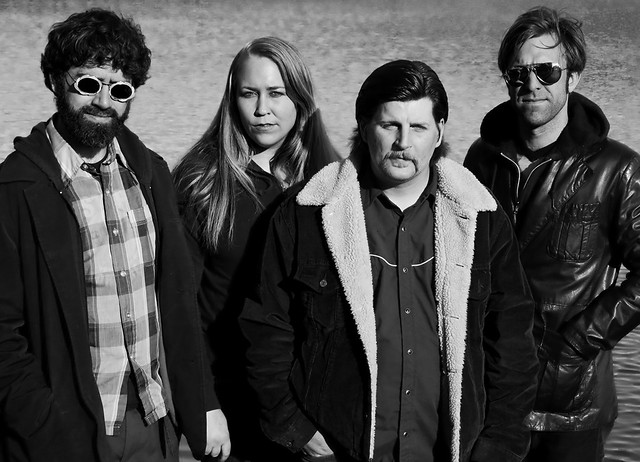
By J. Bennett
It only took him a decade, but it seems that Earth mastermind Dylan Carlson has finally managed to shake off his reputation as The Dude Who Bought Cobain The Shotgun. And it’s about fucking time. When he appeared in Nick Broomfield‘s 1998 documentary Kurt & Courtney–pasty, bedraggled, and practically nodding off mid-interview–Carlson was wallowing in his own miserable nadir. He hadn’t even touched a guitar in two years and was clearly still stepping all over Mr. Brownstone’s toes. His then-vastly under-appreciated contributions to the instrumental rock canon included four albums released on Sub Pop, including the 1993 power-drone masterpiece Earth 2 (which laid the foundation for Sunn O))) to the extent that it basically wrote their first two albums) and 1996’s Pentastar: In The Style Of Demons, music from which Broomfield actually used to great effect in Kurt & Courtney.
After that ill-fated interview, Carlson went back into hiding and didn’t reemerge until 2005. With that year’s Hex: Or Printing in the Infernal Method, Carlson recast himself as a paradigmatic shaman of sepia guitar tones and dark Americana–not to mention an avid student of Neil Young’s Dead Man soundtrack. Last year’s Hibernaculum completed the transformation, as Carlson hauled out some vintage Earth material for a Hex-style makeover. The band’s latest, The Bees Made Honey In The Lion’s Skull, features contributions from veteran jazz guitarist Bill Frisell and further explores the tones that made Hex so unforgettable
“I was too busy trying to survive and get my shit get back together. I wasn’t even listening to music.”
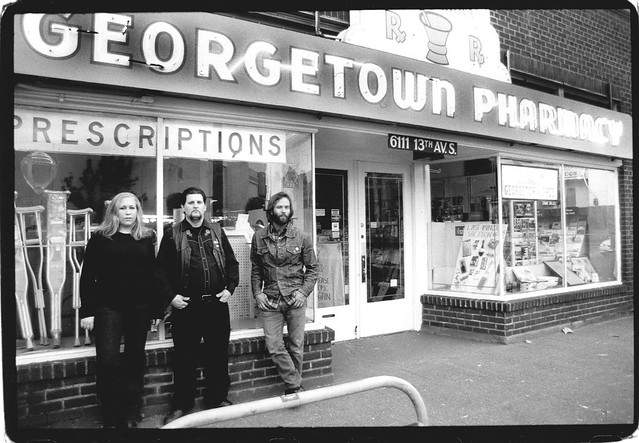
self-titled: It must be a good feeling to be doing well after so many years of playing music and not getting a lot of respect for it.
Yeah. I mean, I would be doing it anyway, but it’s definitely nice when you’re appreciated. Back in the old days, we used to get a lot of heckling and whatnot, but we haven’t had any in a while. Although we just did a New Year’s show with Neurosis, and there were some people in the audience that didn’t think we were metal enough. So it was funny to have some heckling again.
What did they say?
I guess they thought we were too Grateful Dead-ish. [Laughs] Which is kind of ironic for San Francisco. They accused me of unleashing my inner Jerry.
Do you have an inner Jerry?
I guess I do a little bit. I mean, I like the Dead–even though you’re not supposed to admit that in public, apparently.
The title of your new album is a biblical reference, right?
Yeah, it’s from [the story of] Samson and Delilah. There’s also a folk song that mentions it, too. It was actually covered by the Grateful Dead at one point.
Who did the original?
I don’t know. It’s one of those trad-arrs (traditional arrangements). [Laughs] My favorite composer. But there’s also a British company that makes syrup and molasses that has that kind of image as their logo. It’s this weird drawing of a dead lion surrounded by bees. That was one of the first places that I saw it. But it was kind of interesting this time around because with Hex and the previous Earth albums, there was always a strong concept and the music sort of grew out of that. This time, it was the total opposite. I ended up with all this music and then had to start looking for titles. So the order and whatnot came out of the music as opposed to the other way around.
What attracted you to the story of Samson and Delilah?
Well, it has a number of things for me. On a personal level, this album was more of a group effort, whereas before, I would usually show up with everything done. So you have the bees as a sort of communal creature, whereas the lion is singular. There’s also the light out of darkness aspect, which is sort of a redemptive theme that ties in with my hiatus. The lion represents the history of Earth or the legend of Earth, and we’re showing that this is a continuing thing. We’re a living band, not a nostalgia act. There are also a lot of metaphors you could pull out of that: The corpse of the lion is rock n’ roll or western culture or whatever, and the bees making honey is our band or our peer group working away, making something out of it. So there are a lot of interpretations, I guess. I’ve always liked finding stuff that has a bunch of meanings to it rather than telling people, “This is what it’s about.†When you can throw a strong image or idea out there, it allows the audience to participate in creating meaning. And that’s another meaning in and of itself: The audience could represent the bees along with us, helping us create.
Instrumental music is obviously very conducive to multiple interpretations because you don’t have the didactic lyrical aspect.
Yeah, definitely. That’s what I’ve always liked about instrumental music. It feels more : I don’t know if democratic is the word, but everyone’s a participant. It gives credit to the audience; they don’t have to be led around by the nose and told what everything is about. And actually, that’s one thing I always liked about the Dead: They always considered their audience as part of the whole experience, the whole event. It wasn’t just about the band onstage–it was about everybody involved.
How did you hook up with Bill Frisell?
That happened thanks to [Earth organist] Steve Moore. He’s played live with Bill before, and after we did Hex, he gave a copy to Bill and invited us to a couple of our shows in Ballard. He came down and he liked it. He’s a guitarist I admire, and Steve kinda felt like, in our own different ways, we were both working the same patch of ground, I guess. So Bill found some time, came down to the studio and played on three of the tracks. It was really, really amazing.
You mentioned your nine-year hiatus earlier. In the time between Pentastar and Hex, how long did you go without touching a guitar?
I actually didn’t even own a guitar from the end of the Pentastar until about 2000, so four years. Music wasn’t in my : I was consumed by other things, you know? I was too busy trying to survive and get my shit get back together. I wasn’t even listening to music.
At what point did you strike upon the Hex sound?
Probably about a year before we recorded it. I started playing with Adrienne and we did a tour as a two-piece. We did that Living In The Gleam [Of an Unsheathed Sword] album, and listening back, it sounds like a getting-everything-out sort of thing. It’s not very coherent or cohesive. It was more of a therapeutic thing that maybe shouldn’t have been released. [Laughs] That’s the way I kind of look at it now. Me and Adrienne are always sort of chagrined when it gets brought up, but I’ve started to look at it more as therapy than music. So from that point on was when I started writing and working on material for what would become Hex.
You’d obviously heard Neil Young’s Dead Man soundtrack somewhere in there.
I’d seen the movie, yeah. And I really liked the soundtrack–it was amazing. I’ve always liked Neil Young, though. I had just started playing guitar again and I’d been listening a lot to Telecaster players like Danny Gatton and Roy Buchanan, so when I went to buy a guitar again, I knew I wanted a Telecaster. I was really looking to expand my tonal palette, which is probably why I was attracted to the cleaner guitar sounds. I suppose maybe there’s some correspondence between being physically clean and wanting to play clean. [Laughs]
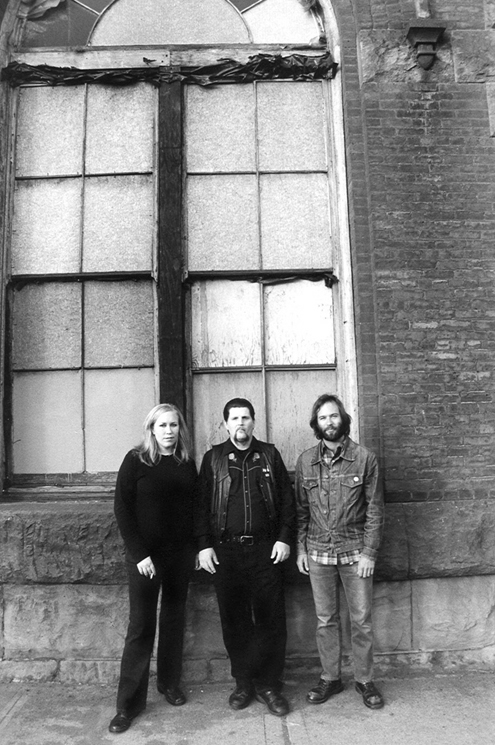
Sunn O))) started during Earth’s hiatus, and at first what they were doing was clearly an homage to what you had done on Earth 2. Their first EP even had a song called “Dylan Carlson.†By the time you came back, it seemed like Sunn O))) had completely usurped Earth’s style, so it made complete sense that Hex was totally different than previous Earth records–you pretty much had to do something else.
[Laughs] Yeah, Hex was different in a lot of ways because it was done with a real negative set of parameters. I had the attitude that I wanted to do the opposite of what I had done before. This new album is more just making music, but with Hex, I was working against what I had done in the past. It was a very conscious decision to have no distortion or anything like that. There was a conceptual framework in place before the music was even made. To me, Earth 2 was such an extreme statement. I’m not saying extreme in that it was so long or abrasive, because there’s been plenty of stuff like that; I just mean that it was a very limited way of working. There wasn’t that far to go in that direction. I think the only place to go would be maybe one tone for an entire record. [Laughs] So I was definitely looking for a new way of doing things. I mean, I want there to be continuity to what I do, but I don’t wanna repeat myself. Expanding my abilities on guitar and moving forward in some way has always been the goal for me.
Bringing in someone like Bill to play on the new record also kind of follows Sunn O)))’s pattern of expansion through collaboration. Do you see yourself eventually bringing in more guest musicians as Earth progresses?
I think it depends on the situation. I’m definitely really happy with the band we have now–Steve and [bassist] Don [McGreevy] and [drummer] Adrienne [Davies]–so if we brought someone else in it would definitely have to be for a reason. I mean, Earth really feels like a band finally. Before it was kind of me and whoever I could get in order to get the project done.
So you don’t have a wish list of people you’d like to collaborate with?
Not yet. But one of the projects I hope to do at one point is kind of a solo thing that would be a collection of guitar duets between me and some guitarists that I like. I don’t know whether that’ll happen or not, but I’ve been thinking about it for a while.
Who would you like to do that with?
I’d like to do something with Jack Rose. We just did a European tour with Richard Bishop–he’s amazing, and we already did a split release with him, so I’d love to work with him again. And maybe Bill again and Robert [Lowe] from Lichens if I could get him. I’ve also talked to Scott [Kelly] from Neurosis, and he seemed interested.
You often mention the influence minimalists like Terry Riley and La Monte Young had on your playing, especially the earlier Earth material. Do you see yourself becoming less of a minimalist as times goes on?
I don’t know : I mean, I don’t think so, but I’m not as hell-bent on having the songs be as long as possible, so maybe that means I’m less of a minimalist. But I still like repetition and if there’s improvisation going on, I still like the background to be fairly limited. But even with improvised stuff that I like, I tend to gravitate towards the slower, more lyrical stuff as opposed to the busy stuff. For whatever reason, I just like a lot of space in the music. I don’t like it when things get filled up and frenetic. But I think Earth has always had that sense of repetition, even though it may be less obvious these days.
It seems like you’ve been fairly prolific since Hex. Do you attribute that to being clean?
Yeah. I’m a more effective human being now that I’ve put music first, where it belongs. When I first started out, music was the most important thing, but gradually it slipped [laughs] and something else got put in front of it. Drugs became more important. You know, there’s a great quote on this King Crimson box set that Robert Fripp wrote. He said, “As a musician, the only reward is music.†And that’s how I feel now. When I started playing again, I wasn’t even sure if I was gonna do Earth again or not. I just wanted to play music.

